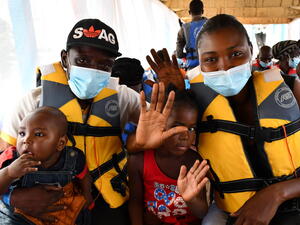Exceptional repatriation of long-time Congolese refugees ends
Exceptional repatriation of long-time Congolese refugees ends

A man born in the Sudan is welcomed on arrival in the Democratic Republic of the Congo (DRC), which his parents fled years ago. He was among 648 refugees brought home to DRC on an exceptional basis in an airlift that ended on Sunday.
BUTA, Democratic Republic of the Congo, June 19 (UNHCR) - Taken to Sudan as an infant, Alberto Imangilikuwa saw his native country for the first time on Sunday.
"I am now 41 and ready to start a new life," he said on arrival at Buta airport in northern Democratic Republic of the Congo (DRC) after years in exile. "I am now middle-aged and ready to start new ventures in life," he said in Juba Arabic, a language he speaks more fluently than his native Lingala.
Imangilikuwa was one of 648 long-time refugees brought home to DRC on an exceptional basis in an airlift that ended on Sunday. His parents, like many of the other Congolese refugees UNHCR has brought home in the last six weeks, fled to Sudan in 1965, when Alberto was just four months old.
The group fled the post-independence turmoil and the coup that brought Mobutu Sese Seko to power that year in the country he renamed Zaire, now DRC. They settled in Juba, which recently became the capital of southern Sudan.
The UN refugee agency agreed to repatriate the group despite the fact that UNHCR did not consider the conditions in the specific areas of return to be favourable and conducive to sustainable return, and it is not in a position to provide any reintegration assistance.
"These refugees, because of their advanced age and poor living conditions in Sudan, have demanded repatriation to the Democratic Republic of the Congo - fully aware of the difficult situation in their areas of return and that there is no reintegration assistance available," UNHCR spokeswoman Jennifer Pagonis told journalists in Geneva when the repatriation began in early May.
"Nevertheless, it should be noted that the overall security has somewhat improved in the return areas," she added. "The entire group registered for return to the DRC has been thoroughly informed of the difficult situation they will face back home, but remain strongly determined to return."
The last 60 refugees returning from Juba on Sunday were highly emotional when their plane - chartered by the International Organization for Migration - landed. Most of the women burst out singing and yelling in jubilation, while others sobbed openly.
"Mbira, mbira" ("palm tree, palm tree") shouted the men, overjoyed at the sight of the thick forest surrounding Buta airport. For their entire exile in Sudan, they had never seen the beloved palm trees from which their favourite cooking oil is extracted.
Repatriation by aircraft was necessary because the towns the refugees were returning to lie in Orientale province, which is about the size of Spain but lacks vital roads and bridges. Buta, the last of many rural town destinations for the 648 returnees, is 800 kilometres south-west of Juba.
In preparation for the return, UNHCR and representatives of the National Commission for Refugees, an inter-ministerial body of the DRC government, have used UN-sponsored radio to encourage residents to welcome those coming home after four decades in exile. In addition, residents were invited to assist the returnees in identifying their relatives.
By Peter Butili Farajallah in Buta, Democratic Republic of the Congo








